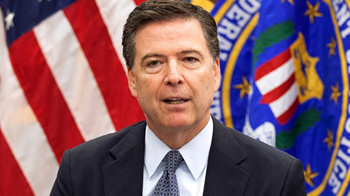Washington, May 10: President Donald Trump today abruptly fired FBI Director James Comey who was leading an investigation into whether his election campaign had links to Russias alleged interference in the US polls, a surprise move that has created a political furore.
 In a letter, Trump told Comey, 56, that he was no longer effectively able to lead the bureau and it was necessary to restore "public trust and confidence" in it.
In a letter, Trump told Comey, 56, that he was no longer effectively able to lead the bureau and it was necessary to restore "public trust and confidence" in it.
"You are hereby terminated and removed from the office, effective immediately," Trump said in the letter.
The shock move comes days after Comey testified on Capitol Hill about the FBIs investigation into Russias meddling into the US elections and a possible collusion between Trump campaign and Moscow.
In the letter, Trump acknowledged that Comey had informed him "on three separate occasions" that he was not under investigation. "I nevertheless concur with the judgement of the Department of Justice that you are not able to effectively lead the bureau," he added.
The White House said the search for a new FBI director would begin immediately.
Press Secretary Sean Spicer told reporters: "The president has accepted the recommendation of the Attorney General (Jeff Sessions) and the Deputy Attorney General (Rod Rosenstein) regarding the dismissal."
In a statement released by the White House, Trump said: "The FBI is one of our nations most cherished and respected institutions and today will mark a new beginning for our crown jewel of law enforcement."
Comey had courted controversy during the 2016 presidential polls when he revealed a renewed investigation into Hillary Clintons email use, which the Democrats claimed had hurt her chances of becoming president.
Deputy Attorney General Rod Rosenstein, in his letter to Trump, criticised Comeys handling of the Clinton probe, including the directors decision to hold a press conference announcing its findings and releasing "derogatory information" about her.
In a separate letter, Sessions said he has concluded that a fresh start is needed at the leadership of the FBI, based on his evaluation as well the reasons expressed by the Deputy Attorney General.
"It is essential that this Department of Justice clearly reaffirm its commitment to longstanding principles that ensure the integrity and fairness of federal investigations and prosecutions," Sessions said.
Comey was addressing FBI agents in Los Angeles when he was handed a note by one of his team informing him he had just been fired. He was four years into his 10-year term.
It wasn?t immediately clear how Comeys ouster will affect the Russia probe, but Democrats said they were concerned that his ouster could derail the investigation.
"I told the president, Mr President, with all due respect you are making a big mistake," Chuck Schumer, the top Democrat in the Senate, told reporters.
The Senate Minority Leader demanded that the Department of Justice appoint a special prosecutor to investigate Russias alleged influence on the 2016 elections.
"The firing of top officials like Sally Yates and Preet Bharara, and now Comey does not seem to be a coincidence," Schumer said.
Schumer also questioned the timing of the decision.
"If the administration had objections to the way Director Comey handled the Clinton investigation, they had those objections the minute the president got into office. But they didnt fire him then. Why did it happen today?" he asked.
House Democratic Caucus Chairman Joe Crowley said Comeys dismissal is extremely troubling.
"President Trump fired the man investigating him and his cohorts. I strongly support calls for the appointment of a special prosecutor," he said.
Terming the move as "nearly unprecedented", Indian- American Congressman Raja Krishnamoorthi said it was extremely disturbing that the Chief Executive is interfering with an ongoing investigation into his administration by firing the person charged with conducting it.
Republican Senator John McCain, the Chairman of Armed Services Committee, said he was disappointed by Trump?s decision to dismiss Comey.
"James Comey is a man of honour and integrity, and he has led the FBI well in extraordinary circumstances. I have long called for a special congressional committee to investigate Russias interference in the 2016 election," he said.
"The presidents decision to remove the FBI Director only confirms the need and the urgency of such a committee," McCain said.





Comments
Add new comment